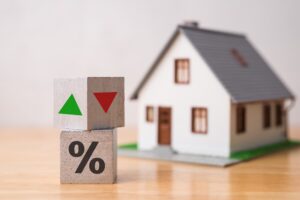Spring Market Is Almost Here: 5 Things Smart Sellers Do Before March
 The spring real estate market is right around the corner — and if history tells us anything, it’s that prepared sellers win.
The spring real estate market is right around the corner — and if history tells us anything, it’s that prepared sellers win.
Buyers start house hunting as early as February. By March, competition heats up, inventory increases, and the best listings move quickly. If you’re thinking about selling, now is the time to get ahead.
Here are five smart things successful sellers do before March to stand out and maximize their home’s value.
1. They Declutter (and Depersonalize) Early
Spring buyers aren’t just shopping for a house — they’re imagining a fresh start.
Smart sellers:
- Remove excess furniture to make rooms feel larger
- Clear countertops and storage spaces
- Pack away personal photos and bold décor
- Organize closets and garages
The goal is simple: create a clean, neutral space where buyers can picture themselves living.
Pro Tip: Start packing now. It reduces stress later and gets you one step closer to moving.
2. They Handle Repairs Before Listing
Small issues can turn into big negotiation points.
Before March, experienced sellers:
- Fix leaky faucets
- Repair cracked tiles or drywall
- Replace burnt-out light bulbs
- Service HVAC systems
- Touch up chipped paint
Buyers notice details. A well-maintained home signals that the property has been cared for — and that can lead to stronger offers.
3. They Boost Curb Appeal Before the Rush
First impressions matter — especially in spring.
Smart sellers prepare the exterior early by:
- Power washing siding and driveways
- Cleaning windows
- Trimming trees and shrubs
- Refreshing mulch
- Painting or updating the front door
When buyers scroll listings online, exterior photos are often what make them click. A polished exterior creates instant appeal.
4. They Price Strategically — Not Emotionally
The spring market is competitive. Overpricing can cause a home to sit, even when demand is strong.
Savvy sellers:
- Review comparable recent sales
- Analyze local inventory levels
- Understand seasonal demand
- Consult with a knowledgeable real estate professional
The right price creates urgency. In many cases, pricing strategically can generate multiple offers — which often drives the final price higher than expected.
5. They Prepare for Professional Marketing
Spring buyers expect high-quality listings.
That means:
- Professional photography
- Strong online descriptions
- Video walkthroughs or virtual tours
- Social media exposure
- Targeted digital marketing
The earlier you plan your marketing strategy, the smoother your launch will be when the market heats up.
Why Acting Before March Matters
By the time most sellers decide to list in late March or April, smart sellers are already under contract.
Preparing now gives you:
- More time to complete improvements
- Less stress
- Better staging opportunities
- A competitive edge
The spring market rewards preparation. Sellers who start early often attract serious buyers quickly — and negotiate from a position of strength.
Final Thoughts
If you’re even considering selling this spring, don’t wait until the flowers bloom.
Start preparing now. Declutter. Make repairs. Improve curb appeal. Price wisely. Plan your marketing.
Spring is coming — and the smartest sellers are already getting ready.
Compliments of Virtual Results




 Real estate taxes—also known as property taxes—are a major ongoing cost of homeownership. Yet many homeowners don’t fully understand how these taxes are calculated, why they change, or how to reduce them.
Real estate taxes—also known as property taxes—are a major ongoing cost of homeownership. Yet many homeowners don’t fully understand how these taxes are calculated, why they change, or how to reduce them. Buying or selling a home is one of the biggest financial decisions you’ll ever make—and the realtor you choose can make or break the experience. While most people focus on price, location, or timing, the truth is this: picking the wrong realtor can quietly cost you thousands of dollars, months of stress, and missed opportunities.
Buying or selling a home is one of the biggest financial decisions you’ll ever make—and the realtor you choose can make or break the experience. While most people focus on price, location, or timing, the truth is this: picking the wrong realtor can quietly cost you thousands of dollars, months of stress, and missed opportunities. If you’re planning to buy a home, getting pre-approved for a mortgage should be one of your very first steps. It shows sellers you’re serious, helps you understand your budget, and can even give you an edge in a competitive housing market.
If you’re planning to buy a home, getting pre-approved for a mortgage should be one of your very first steps. It shows sellers you’re serious, helps you understand your budget, and can even give you an edge in a competitive housing market. Buying a home is exciting—but it’s also one of the biggest financial commitments you’ll ever make. While most buyers plan for the down payment and monthly mortgage, many are caught off guard by hidden home buying costs that quickly add up.
Buying a home is exciting—but it’s also one of the biggest financial commitments you’ll ever make. While most buyers plan for the down payment and monthly mortgage, many are caught off guard by hidden home buying costs that quickly add up. Pet ownership continues to rise, and in 2026, buyers aren’t just allowing pets—they’re actively shopping for homes designed with them in mind. For sellers, builders, and real estate professionals, understanding pet-friendly home features is no longer a niche advantage—it’s a serious market differentiator.
Pet ownership continues to rise, and in 2026, buyers aren’t just allowing pets—they’re actively shopping for homes designed with them in mind. For sellers, builders, and real estate professionals, understanding pet-friendly home features is no longer a niche advantage—it’s a serious market differentiator. In today’s competitive real estate market, not all home renovations are created equal. Whether you’re planning to sell soon or simply want to invest wisely in your property, choosing the right upgrades can significantly increase your home’s value—and its appeal to buyers.
In today’s competitive real estate market, not all home renovations are created equal. Whether you’re planning to sell soon or simply want to invest wisely in your property, choosing the right upgrades can significantly increase your home’s value—and its appeal to buyers. Selling your home doesn’t have to feel overwhelming. With the right plan—and the right timing—you can sell faster, attract serious buyers, and maximize your profit. This step-by-step home selling checklist breaks the process down into clear, actionable steps so you know exactly what to do and when to do it.
Selling your home doesn’t have to feel overwhelming. With the right plan—and the right timing—you can sell faster, attract serious buyers, and maximize your profit. This step-by-step home selling checklist breaks the process down into clear, actionable steps so you know exactly what to do and when to do it. Choosing the right neighborhood is just as important—if not more—than choosing the right home. A beautiful house in the wrong area can quickly turn into a daily frustration, while an average home in the right neighborhood can dramatically improve your quality of life.
Choosing the right neighborhood is just as important—if not more—than choosing the right home. A beautiful house in the wrong area can quickly turn into a daily frustration, while an average home in the right neighborhood can dramatically improve your quality of life. Rising mortgage rates have become one of the most talked-about topics in real estate. Whether you’re planning to buy your first home, sell a property, or simply track housing market trends, understanding how higher interest rates affect buyers and sellers is essential.
Rising mortgage rates have become one of the most talked-about topics in real estate. Whether you’re planning to buy your first home, sell a property, or simply track housing market trends, understanding how higher interest rates affect buyers and sellers is essential.

 Catch Our Feed
Catch Our Feed Subscribe via Email
Subscribe via Email Follow Our Tweets
Follow Our Tweets Friend Us On Facebook
Friend Us On Facebook Watch Us On Youtube
Watch Us On Youtube